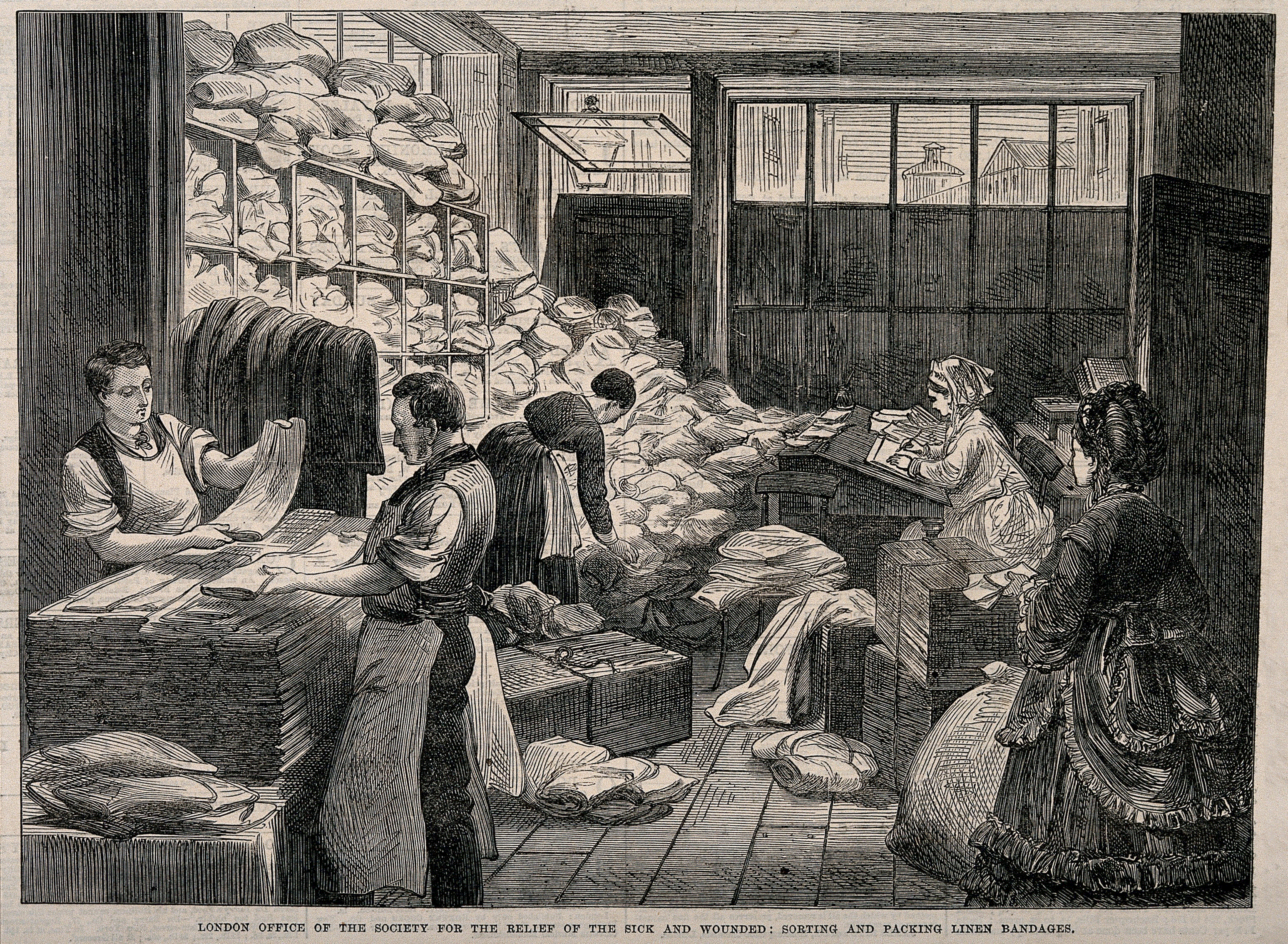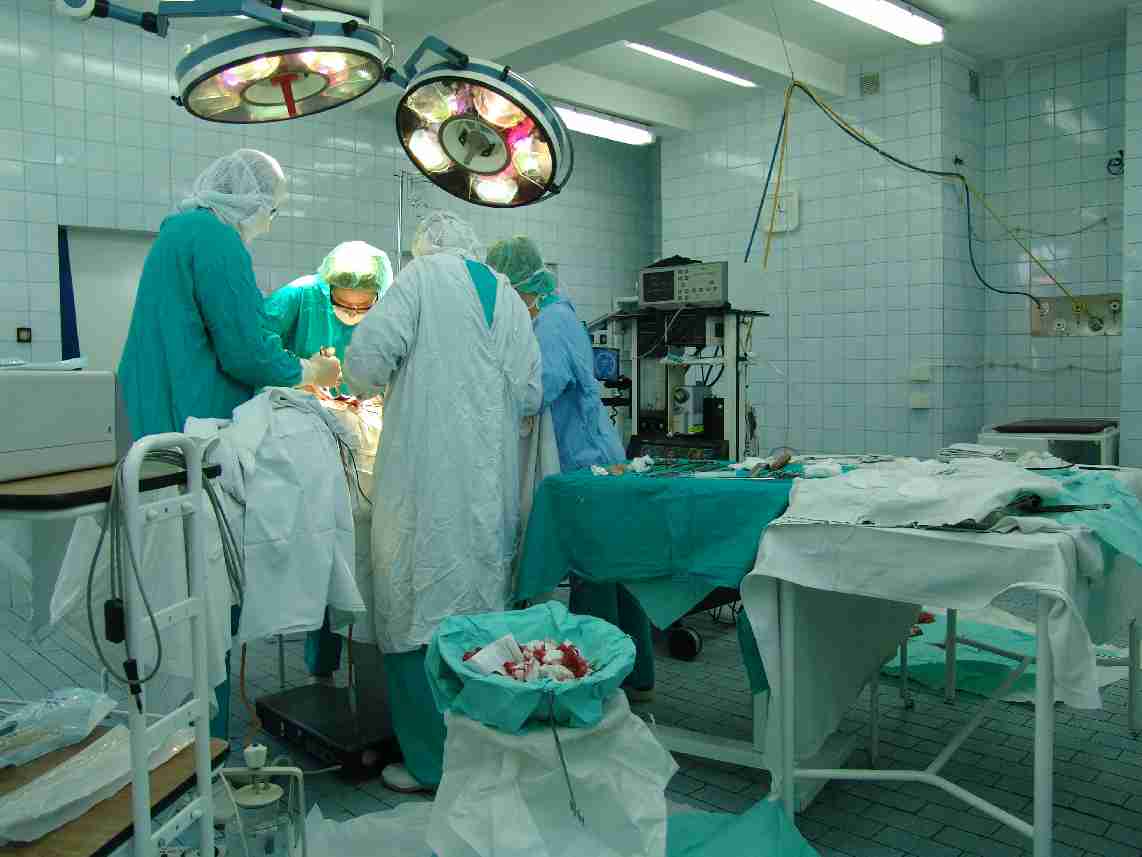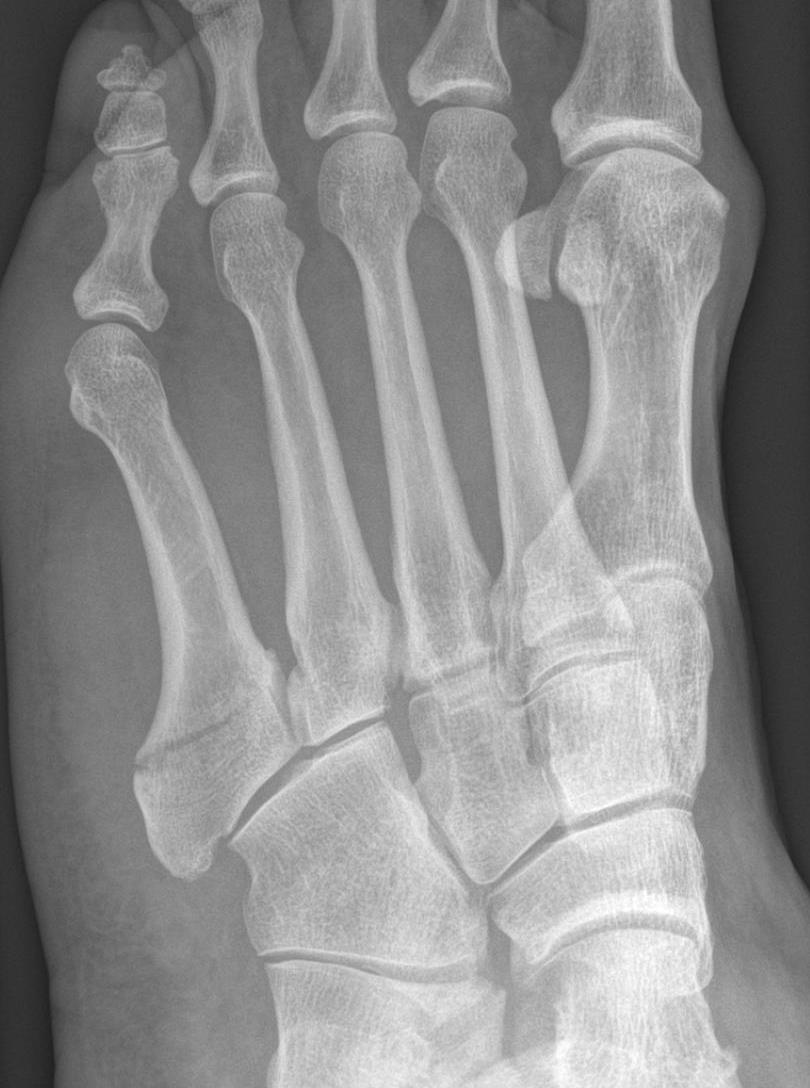|
Agnes Hunt
Dame Agnes Gwendoline Hunt DBE RRC (31 December 1866 – 24 July 1948) was a British nurse, who is generally recognised as the first orthopaedic nurse. Early life She was born in London, daughter and sixth of eleven children of Rowland Hunt (1828-1878) of Boreatton Park, Baschurch, a village in west Shropshire, England, and his wife, Florence Marianne, eldest daughter of Richard Buckley Humfrey of Stoke Albany, Northamptonshire, England. She was a cousin of the Naval officer Sir Nicholas Hunt, his son being the politician Jeremy Hunt. Her own brother, another Rowland Hunt (1858-1943) was also a politician. Hunt was brought up at Boreatton Park until 1882, then at Kibworth Hall, Leicestershire before her widowed mother took the children to Australia, where they lived on a small farmstead. She was disabled from osteomyelitis of the hip that she suffered from as a child following septicaemia. Nursing career In 1887, she returned to England and began training as a "lady pupil" ... [...More Info...] [...Related Items...] OR: [Wikipedia] [Google] [Baidu] |
Baschurch, Shropshire
Baschurch is a large village and civil parish in Shropshire, England. It lies in North Shropshire, north-west of Shrewsbury. The village has a population of 2,503 as of the 2011 census. The village has strong links to Shrewsbury to the south-east, Oswestry to the north-west, and Wem to the north-east. There is a large village not far west of Baschurch called Ruyton-XI-Towns. History The earliest references to Baschurch are under its Welsh name ''Eglwyssau Bassa'' (Churches of Bassa), in a seven-stanza ''englyn''-poem of the same name found in the Welsh cycle of poems called ''Canu Heledd'', generally thought to date to the ninth century: The English name ''Baschurch'' first appears in the Domesday Book of 1086 as ''Bascherche'', and both names may derive from an Anglo-Saxon personal name ''Bass(a)''. Thus the name in ''Canu Heledd'' is a Brittonic version of an English name. Local tradition holds that the Berth Pool and its ancient earthworks outside the village are the resti ... [...More Info...] [...Related Items...] OR: [Wikipedia] [Google] [Baidu] |
Septicaemia
Sepsis, formerly known as septicemia (septicaemia in British English) or blood poisoning, is a life-threatening condition that arises when the body's response to infection causes injury to its own tissues and organs. This initial stage is followed by suppression of the immune system. Common signs and symptoms include fever, increased heart rate, increased breathing rate, and confusion. There may also be symptoms related to a specific infection, such as a cough with pneumonia, or painful urination with a kidney infection. The very young, old, and people with a weakened immune system may have no symptoms of a specific infection, and the body temperature may be low or normal instead of having a fever. Severe sepsis causes poor organ function or blood flow. The presence of low blood pressure, high blood lactate, or low urine output may suggest poor blood flow. Septic shock is low blood pressure due to sepsis that does not improve after fluid replacement. Sepsis is caused by m ... [...More Info...] [...Related Items...] OR: [Wikipedia] [Google] [Baidu] |
Oswestry
Oswestry ( ; ) is a market town, civil parish and historic railway town in Shropshire, England, close to the Welsh border. It is at the junction of the A5, A483 and A495 roads. The town was the administrative headquarters of the Borough of Oswestry until that was abolished in 2009. Oswestry is the third-largest town in Shropshire, following Telford and Shrewsbury. At the 2011 Census, the population was 17,105. The town is five miles (8 km) from the Welsh border and has a mixed English and Welsh heritage. Oswestry is the largest settlement within the Oswestry Uplands, a designated natural area and national character area. Toponym The name ''Oswestry'' is first attested in 1191, as ''Oswaldestroe''. This Middle English name transparently derives from the Old English personal name Ōswald and the word ''trēow'' ('tree'). Thus the name seems once to have meant 'tree of a man called Ōswald'.A. D. Mills, ''A Dictionary of English Place Names'' (Oxford: Oxford Universit ... [...More Info...] [...Related Items...] OR: [Wikipedia] [Google] [Baidu] |
Gobowen
Gobowen is a village in Shropshire, England, about 3 miles north of Oswestry. The population according to the 2011 census was 3,270. History The village was previously called ''Bryn-y-Castell'' ("Hill of the Castle" in English) after the Norman motte castle adjacent to the Preeshenlle United Reformed Church, the eastern edge of the site being cut into when the church was built. Alongside this monument there is a section of the 8th century Wat's Dyke. The name changed to Gobowen; this name is believed to originate from Gob (from 'gobennydd', a pillow) and Owen ( Owain Glyndŵr) who was believed to have rested here. However, this name may also originate from a man named Owen who started mining here, and an old Welsh word for mine is 'gob', hence Gobowen (Owen's mine). The mines were filled in by hand during the Second World War by displaced persons and prisoners of war, who were housed in a camp which is now called Bank Top Industrial Estate in the nearby village of St Martins. ... [...More Info...] [...Related Items...] OR: [Wikipedia] [Google] [Baidu] |
British Red Cross Society
The British Red Cross Society is the United Kingdom body of the worldwide neutral and impartial humanitarian network the International Red Cross and Red Crescent Movement. The society was formed in 1870, and is a registered charity with more than 17,200 volunteers and 3,400 staff. At the heart of their work is providing help to people in crisis, both in the UK and overseas. The Red Cross is committed to helping people without discrimination, regardless of their ethnic origin, nationality, political beliefs or religion. Queen Elizabeth II was the patron of the society until her death on 8 September 2022. In the year ending December 2019, the charity's income was £244.9million, which included £68.7M from government contracts and grants. It spent £197.5M (80%) of its income delivering its charitable activities. Guiding ethos The mission of the British Red Cross is to mobilise the power of humanity so that individuals and communities can prepare for, deal with and recover ... [...More Info...] [...Related Items...] OR: [Wikipedia] [Google] [Baidu] |
World War I
World War I (28 July 1914 11 November 1918), often abbreviated as WWI, was one of the deadliest global conflicts in history. Belligerents included much of Europe, the Russian Empire, the United States, and the Ottoman Empire, with fighting occurring throughout Europe, the Middle East, Africa, the Pacific, and parts of Asia. An estimated 9 million soldiers were killed in combat, plus another 23 million wounded, while 5 million civilians died as a result of military action, hunger, and disease. Millions more died in genocides within the Ottoman Empire and in the 1918 influenza pandemic, which was exacerbated by the movement of combatants during the war. Prior to 1914, the European great powers were divided between the Triple Entente (comprising France, Russia, and Britain) and the Triple Alliance (containing Germany, Austria-Hungary, and Italy). Tensions in the Balkans came to a head on 28 June 1914, following the assassination of Archduke Franz Ferdin ... [...More Info...] [...Related Items...] OR: [Wikipedia] [Google] [Baidu] |
Chartered Society Of Massage
{{disambig ...
Chartered may refer to: * Charter, a legal document conferring rights or privileges ** University charter ** Chartered company * Chartered (professional), a professional credential * Charter (shipping) * Charter (airlines) * Charter (typeface) * Chartered Semiconductor Manufacturing, a manufacturing company See also * Charter (other) A charter is the grant of authority or rights. Charter may also refer to: Brands and enterprises * Charter Arms (1964), an American manufacturer of revolvers * Charter Communications (1993), a large American cable television, Internet and phone c ... [...More Info...] [...Related Items...] OR: [Wikipedia] [Google] [Baidu] |
X-ray
An X-ray, or, much less commonly, X-radiation, is a penetrating form of high-energy electromagnetic radiation. Most X-rays have a wavelength ranging from 10 picometers to 10 nanometers, corresponding to frequencies in the range 30 petahertz to 30 exahertz ( to ) and energies in the range 145 eV to 124 keV. X-ray wavelengths are shorter than those of UV rays and typically longer than those of gamma rays. In many languages, X-radiation is referred to as Röntgen radiation, after the German scientist Wilhelm Conrad Röntgen, who discovered it on November 8, 1895. He named it ''X-radiation'' to signify an unknown type of radiation.Novelline, Robert (1997). ''Squire's Fundamentals of Radiology''. Harvard University Press. 5th edition. . Spellings of ''X-ray(s)'' in English include the variants ''x-ray(s)'', ''xray(s)'', and ''X ray(s)''. The most familiar use of X-rays is checking for fractures (broken bones), but X-rays are also used in other ways. ... [...More Info...] [...Related Items...] OR: [Wikipedia] [Google] [Baidu] |
Operating Theatre
An operating theater (also known as an operating room (OR), operating suite, or operation suite) is a facility within a hospital where surgical operations are carried out in an aseptic environment. Historically, the term "operating theater" referred to a non-sterile, tiered theater or amphitheater in which students and other spectators could watch surgeons perform surgery. Contemporary operating rooms are usually devoid of a theater setting, making the term "operating theater" a misnomer in those cases. Operating rooms Operating rooms are spacious, in a cleanroom, and well-lit, typically with overhead surgical lights, and may have viewing screens and monitors. Operating rooms are generally windowless, though windows are becoming more prevalent in newly built theaters to provide clinical teams with natural light, and feature controlled temperature and humidity. Special air handlers filter the air and maintain a slightly elevated pressure. Electricity support has backup systems in ... [...More Info...] [...Related Items...] OR: [Wikipedia] [Google] [Baidu] |
Robert Jones (surgeon)
Sir Robert Jones, 1st Baronet, (28 June 1857 – 14 January 1933) was a Welsh orthopaedic surgeon who helped to establish the modern specialty of orthopaedic surgery in Britain. He was an early proponent of the use of radiography in orthopaedics, and in 1902 described the eponymous Jones fracture. Life and work Robert Jones was born in Llandudno, North Wales, and was brought up in London. His father gave up his career as an architect to take up writing, so his family became quite poor. At the age of 16 he left London to live with his uncle, Hugh Owen Thomas, in Liverpool. He learned about fracture care and the manufacture of braces from his uncle, and attended the Liverpool School of Medicine from 1873 to 1878. He continued to work with his uncle, and was subsequently appointed Honorary Assistant Surgeon to the Stanley Hospital in Liverpool in 1887. [...More Info...] [...Related Items...] OR: [Wikipedia] [Google] [Baidu] |
Surgery
Surgery ''cheirourgikē'' (composed of χείρ, "hand", and ἔργον, "work"), via la, chirurgiae, meaning "hand work". is a medical specialty that uses operative manual and instrumental techniques on a person to investigate or treat a pathological condition such as a disease or injury, to help improve bodily function, appearance, or to repair unwanted ruptured areas. The act of performing surgery may be called a surgical procedure, operation, or simply "surgery". In this context, the verb "operate" means to perform surgery. The adjective surgical means pertaining to surgery; e.g. surgical instruments or surgical nurse. The person or subject on which the surgery is performed can be a person or an animal. A surgeon is a person who practices surgery and a surgeon's assistant is a person who practices surgical assistance. A surgical team is made up of the surgeon, the surgeon's assistant, an anaesthetist, a circulating nurse and a surgical technologist. Surgery usually spa ... [...More Info...] [...Related Items...] OR: [Wikipedia] [Google] [Baidu] |
Liverpool
Liverpool is a city and metropolitan borough in Merseyside, England. With a population of in 2019, it is the 10th largest English district by population and its metropolitan area is the fifth largest in the United Kingdom, with a population of 2.24 million. On the eastern side of the Mersey Estuary, Liverpool historically lay within the ancient hundred of West Derby in the county of Lancashire. It became a borough in 1207, a city in 1880, and a county borough independent of the newly-created Lancashire County Council in 1889. Its growth as a major port was paralleled by the expansion of the city throughout the Industrial Revolution. Along with general cargo, freight, and raw materials such as coal and cotton, merchants were involved in the slave trade. In the 19th century, Liverpool was a major port of departure for English and Irish emigrants to North America. It was also home to both the Cunard and White Star Lines, and was the port of registry of the ocean li ... [...More Info...] [...Related Items...] OR: [Wikipedia] [Google] [Baidu] |






.jpg)
